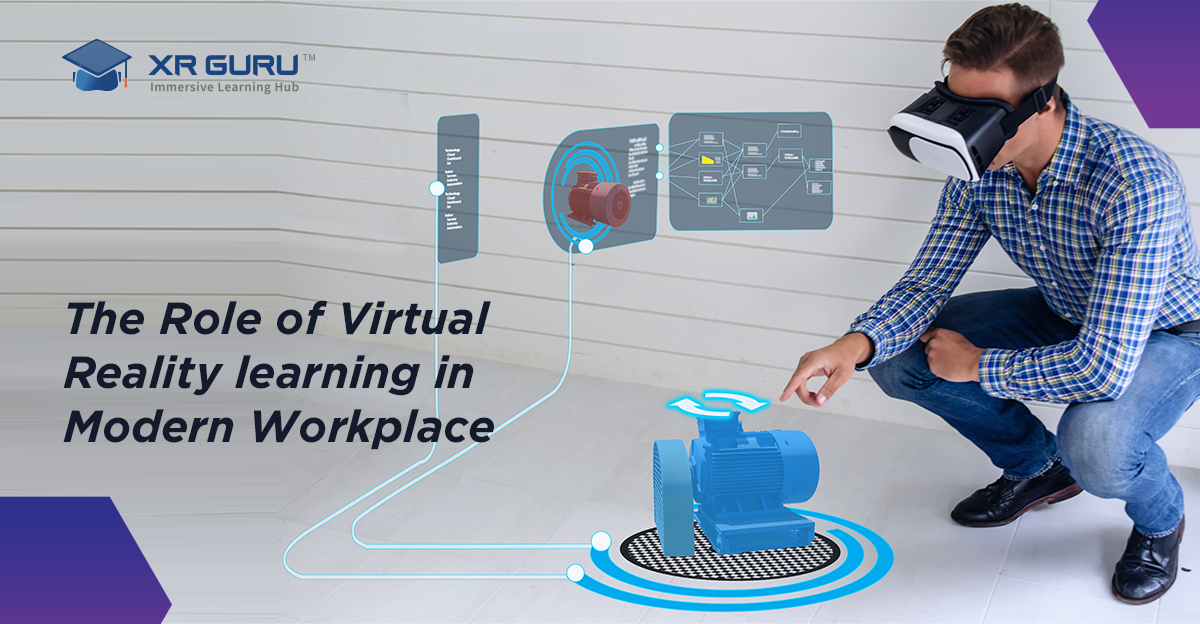
Adopting VR for workforce training offers about several advantages, such as faster learning, better collaboration, and enhanced employee engagement. In this blog, we explore the role of and benefits of VR in corporations.
How to Use Virtual Reality for Workforce Training
Here are some ways organizations can leverage virtual reality learning to train their employees.
Safe Platform for Complex/Risky Training
Virtual reality's life-like nature facilitates a safe environment for hands-on, practical training. VR learning offers a fully immersive training experience through 3D visuals and audio elements. This approach can come in handy when conducting risky or complex training activities as it greatly reduces and helps to eliminate many of the risks involved in real-life training. For example, employees can participate in heavy machine training and hone their skills in a safe environment without fear of making a costly mistake.
Soft Skills Training
Over the years, customers have become more-and-more demanding, forcing companies to invest in soft skills training to improve the customer experience. Virtual reality can help teach soft skills. Scenarios such as dealing with an unhappy customer or giving negative feedback can be very challenging and nerve-wracking. People often wish to develop these skills by practicing in a virtual environment before trying them in the real world. VR-based learning helps you do just that. With the help of VR simulations, employees can interact with computer-generated simulations to perfect their skills rather than speaking to a real-life human. Furthermore, the ability grasp and fully understand a concept or process varies for each employee, and a virtual environment enables each employee to practice as often as necessary to become confident in their skills. Statistics show VR learners are more accurate and 275% more confident in applying their skills after virtual reality training sessions.
Emergency Drills
Companies have to periodically conduct safety drills to keep their employees updated on the safety protocols and things to do in case of an emergency. Virtual reality in offices can help in this regard. For example, you can create a VR fire drill simulation for your employees and give them a firsthand experience of how to react during emergencies. An immersive VR learning environment is more engaging and fun than reading about emergency procedures from a book.
Benefits of VR Learning in Workplace
Here are some advantages of using virtual reality to train your employees.
1. Accelerated Learning
Immersive simulations and 3D visuals help employees learn new information quicker compared to traditional learning methods. According to a PwC study, employees learn information four times faster through VR learning than classroom or online learning modes. Virtual reality significantly reduces the on-job training time while also increasing employee engagement.
2. Enhanced Consumer Experience
Customer satisfaction should be at the heart of everything an organization does; it helps brands build trust and grow profits. Several factors determine the overall user experience, and one of them is well-trained employees. In the age of growing consumer expectations, the lack of skilled employees is bad for business. Using manuals and videos can be costly, time-consuming, and ineffective. Virtual reality makes the knowledge transfer process fun and interactive; therefore, employees quickly learn how to effectively deal with customers.
3. Competitive Edge
Since virtual reality is a relatively new technology, many organizations have yet to realize the immense potential offered by VR. Being one of the early adopters of immersive technology in training can give you a competitive edge and help you leapfrog your competitors by providing a better user experience.
4. Better Knowledge Retention
It does not matter how long you train your employees if they struggle to remember information. Knowledge retention is pivotal for improving productivity. VR learning and hands-on experience help learners retain knowledge for a prolonged period. This is not just an assumption; scientific studies show learning through virtual reality produces better retention rates.
5. Learn from Mistakes
Since VR training is safe, employees no longer have to worry about making costly mistakes. In VR simulations, employees have the opportunity to commit mistakes and learn from them without fear. VR learning supports a trial & error approach, helping learners explore different techniques and arrive at the best possible solution.
Is VR the Future?
Virtual reality is no longer a fancy tech you only see in Sci-Fi movies. Many organizations have already incorporated VR in their training process. VR in employee training is rapidly becoming the new normal. Depending on your training process, the initial VR setup cost can be substantial. However, the long-term benefits in terms of increased employee engagement, rapid knowledge transfer, improved knowledge retention, and enhanced training effectiveness makes it a very cost-effective approach.
Do you wish to introduce VR in corporate training? XR Guru is an immersive learning hub that helps you train your employees using life-like simulations. With tools to create immersive content and track user progress, XR Guru is your best option to facilitate VR learning in the workplace.
Contact us for a free consultation on your virtual reality learning needsSchedule Your Free Consultation